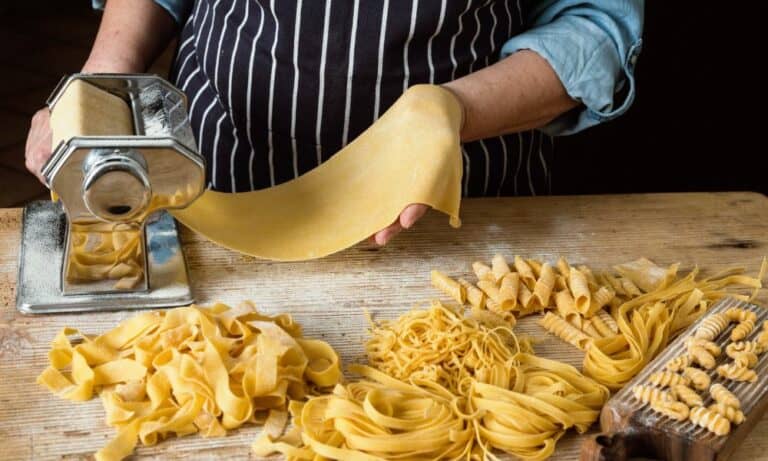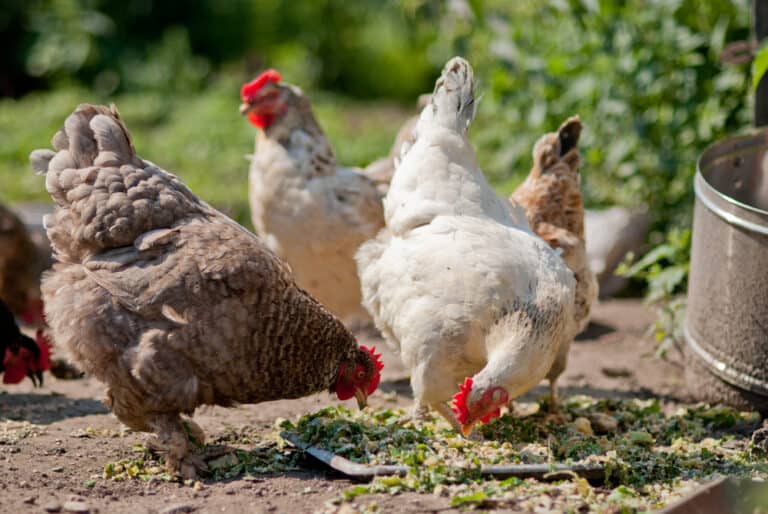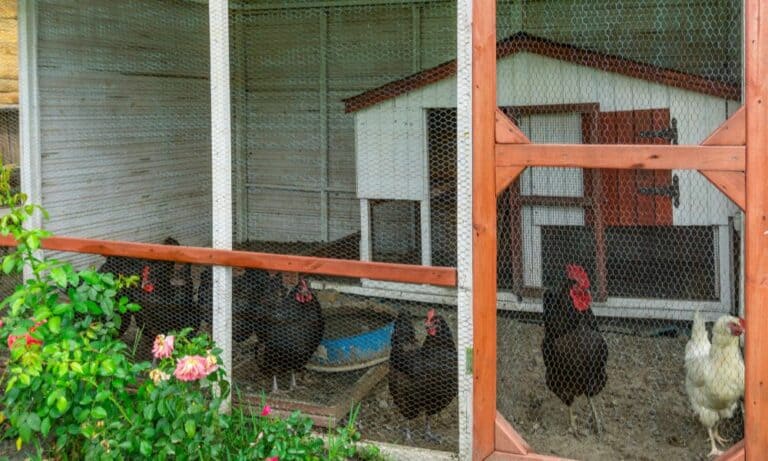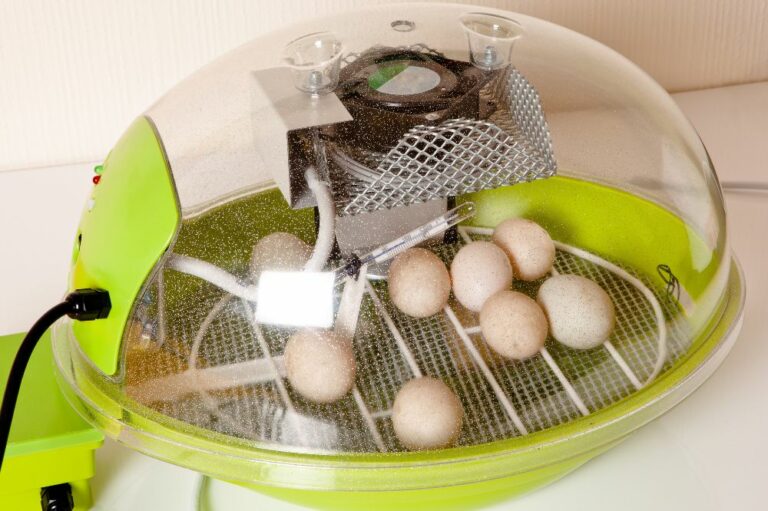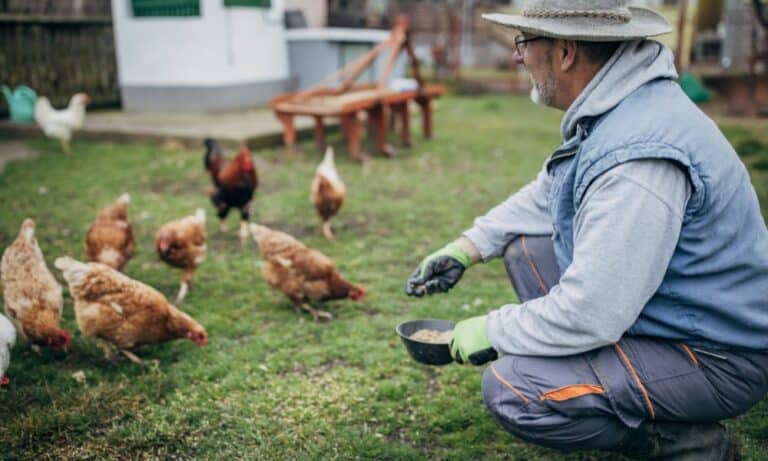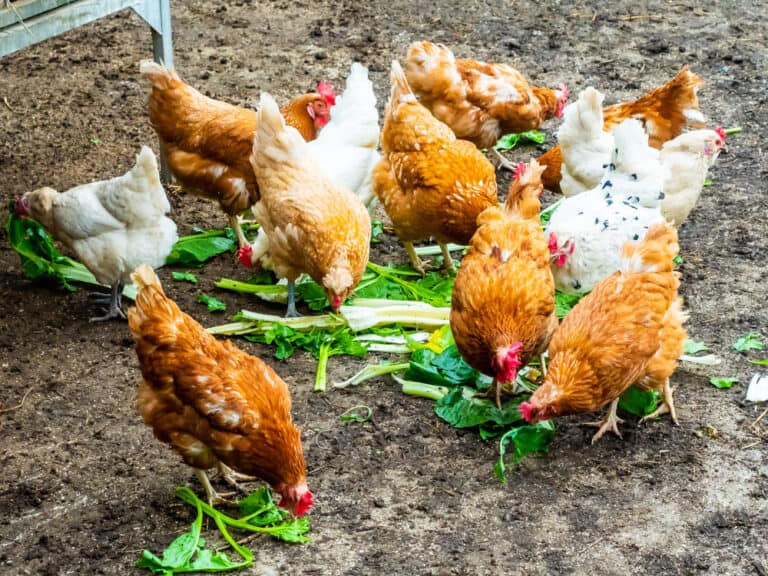Peanuts are delicious nuts most people adore, but some owners can hesitate about their health benefits for poultry. The question is can chickens eat peanuts? One thing is for sure. Your fowl will go crazy over this treat type, and offering it in moderate amounts is safe and healthy.
You should never feed your flock raw and salted peanuts or those with added butter, oils, or seasonings. On the other hand, unsalted roasted or boiled peanuts are a source of fats, vitamins, particularly vitamin E, and numerous minerals.
Nutrition content of 3.50 ounces (100 g) of peanuts |
||||
| Nutrients | Raw peanuts | Roasted unsalted | Dry roasted unsalted | Peanut butter |
| Calories | 567 Kcal | 567 Kcal | 600 Kcal | 597 Kcal |
| Protein | 25.8 g | 26.67 g | 26.67 g | 22.5 g |
| Fats | 49.2 g | 46.67 g | 50 g | 51.1 g |
| Carbs | 16.1 g | 16.67 g | 20 g | 22.3 g |
| Sugar | 4.72 g | 3.33 g | 3.33 g | 10.5 g |
| Fiber | 8.5 g | 10 g | 6.7 g | 4.8 g |
| Water | 6.5 g | / | / | / |
*by USDA
What Are Peanuts?
Despite the name, peanuts (earthnut, pindar, groundnut, monkey nut, goober) are not nuts but legumes originating in South America, primarily Peru and Brazil. Peanuts (Arachis hypogaea) are the fruit of the peanut plant that grows below the ground.
The first confirmed signs of their existence are 3,500-year-old peanut-shaped pottery. In the early 1800s, enslaved Africans brought peanuts to the US, and they quickly became a commercial crop. Nowadays, this country is one of the three top producers in the world, besides China and India.
This annual shrubby plant with pinnately compound leaves is approximately 18 to 24 inches (45.7 – 61 cm) high. You should look underground to find 1 to 2 inches (2.5 – 5 cm) long oblong pods with rounded ends and two or three seeds inside.
Can Chickens Eat Peanuts?
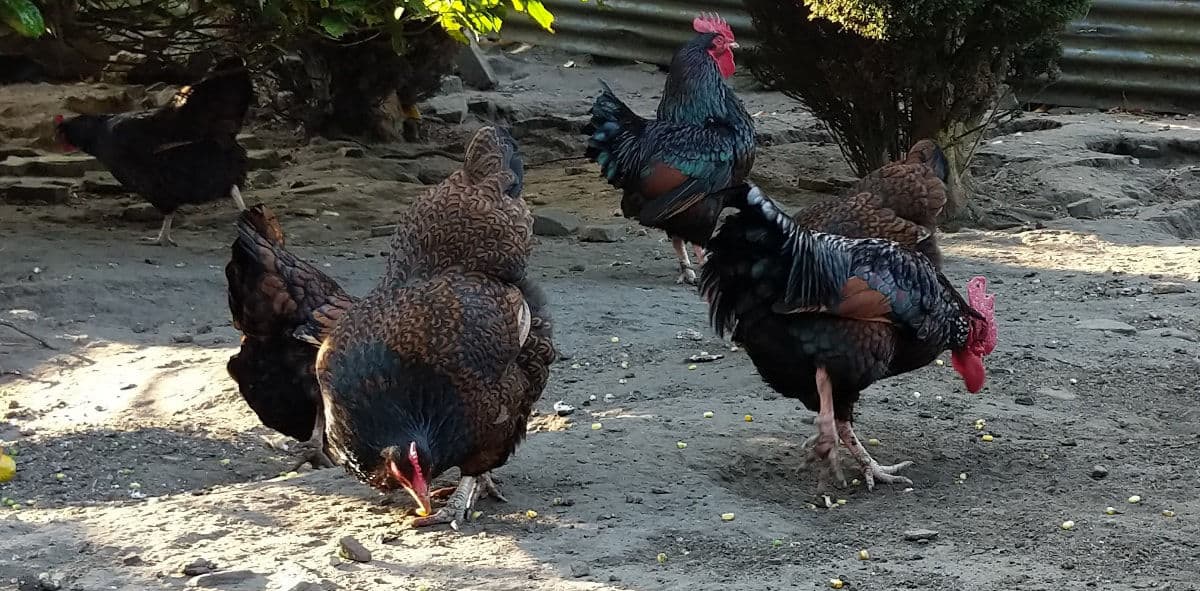
Chickens enjoy eating peanuts, but the only acceptable option is to offer this legume crop plain roasted without additives. Besides, you should treat this food as treats and avoid feeding your flock with this ingredient too often.
Including peanuts in the regular fowl menu adds valuable and healthy nutrients to their diet. These additional calories and fats help hens produce rich-tasting eggs, and meat breeds get more quality meat. However, be careful not to overdo it.
1. Raw peanuts
Be careful with raw peanuts because their green skin is equally harmful to poultry. It contains peanut lectin, a potentially poisonous enzyme to fowl. The best option is to avoid adding this food to chickens’ diet before previous preparation.
On the other hand, peanuts contain trypsin inhibitors, potentially crucial in weight control. They are beneficial for humans, but this trait is undesirable for food offered to broilers breeding to grow fast and gain muscle mass.
2. Unsalted peanuts
Properly cooked unsalted peanuts are a delicious treat for chickens without excess salt. The occasional offering once or twice a week helps fowl enjoy their nutritional benefits without health risks.
3. Whole peanuts
Since chickens can eat whole peanuts, throwing a few pods from time to time can provide excellent entertainment for the entire flock. Additionally, they enjoy picking and breaking shells to reach peanuts hidden inside.
4. Salted peanuts
Chickens tolerate salt in small amounts, but salted peanuts contain a too-high sodium chloride percentage. Its excessive amount is highly harmful to chicken health, disrupts their digestive system, causes diarrhea, and can be potentially deadly.
Be aware that laying hens require more sodium chloride in their diet than other flock members. However, an excessive amount of salt causes eggshell defects and increases the occurrence of shell-less eggs.
5. Roasted peanuts
You can offer roasted peanuts to your chickens, but avoid preparing them with oil or butter. Besides, never prepare them with chocolate that is toxic to chickens. Finally, always cool down peanuts before serving to prevent possible chicken mouth burning.
6. Boiled peanuts
Boiled peanuts benefit chickens since they contain high antioxidant levels that improve their health and help them gain weight. In fact, boiling causes peanuts to release more antioxidants than any other preparation method.
Be careful not to overdo it because your goal is not to encourage obesity. Additionally, never add oils while cooking these legumes.
7. Seasoned peanuts
Seasonings should never be a part of your chickens’ diet. Therefore, you should avoid offering snacks with artificial spices and flavorings like Planters Heat Peanuts.
8. Oily peanuts
Never offer peanuts cooked in oil to your chickens because they have a problem digesting greasy food.
9. Peanut pods
Some chickens like pecking crushed peanut shells, but others avoid them. Occasionally offering them is beneficial for fowl because of their high levels of protein and fibers. On the other hand, you can use ground pods as chicken bedding in nesting boxes.
10. Peanut butter
Peanut butter contains approximately 25% of protein or more than laying hens’ daily needs, making this food an excellent treat. Unfortunately, it is also high in fat, so adding it too often to the chicken diet can be unhealthy.
Never offer salted peanut butter, and be prepared that some chickens avoid it because it is too sticky. Mix this treat with other food, preferably seeds, to make it easier to swallow.
11. Peanut plants and leaves
If you grow peanuts in your garden, you can use stems and above-ground foliage as safe food for your chickens. On the other hand, never offer them roots as potentially harmful.
12. Can chicks eat peanuts?
Be particularly careful when preparing food for chicks since their digestive system is highly sensitive. They require easily digested ingredients, so offering peanuts is not wise.
However, some breeders believe that small amounts of unsalted cooked peanuts can be beneficial. The best option is to consult your vet before introducing them for the first time.
Ways to Feed Your Chickens With Peanuts

Peanuts are non-standard feed for chicken, so you should consider them as treats and offer them only occasionally. They are rich in fats, making this food beneficial for laying hens and producing rich-tasting eggs.
However, adding peanuts to everyday meals leads to overweighing and obesity, making it a bad option for chickens’ health. If you have excessive amounts and want to share them with your flock, the best measure is a quarter cup of roasted unsalted legumes once a week.
If you see leftovers after fowl finish the meal, you can conclude that you have offered too many peanuts. So, reduce the amount the next time and always keep it under 10% of the daily caloric intake per chicken.
The best way to make peanuts beneficial and fun for fowl is to toss dry-roasting legumes on the ground or mix them with the morning feed. You can also hang whole pods on the branch or offer yummy peanut butter leftovers and let chickens catch them when wanted.
Peanuts Nutritional Value
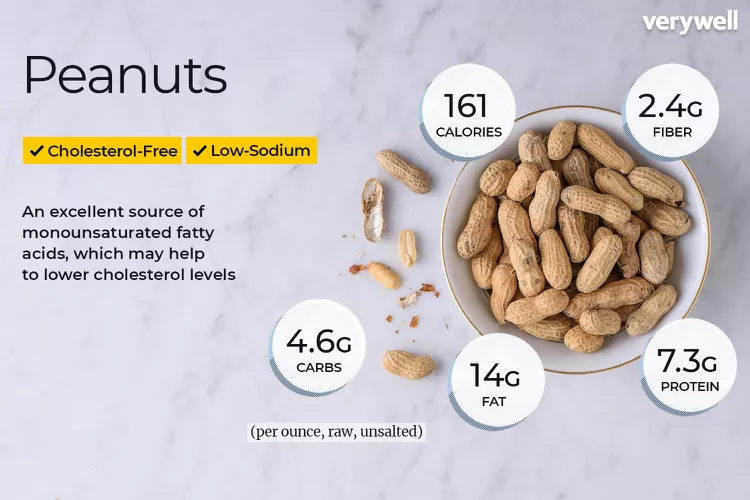
Peanuts contain high protein levels beneficial for chickens’ muscles, while minerals, trace elements, and vitamins contribute to egg quality and overall bone health. For instance, magnesium regulates nerve and muscle function, while manganese keeps bones healthy and allows connective tissue formation.
Most mono and poly-unsaturated fatty acids in peanuts are in the form of linoleic and oleic acids, making this food essential for chicks to gain weight. Finally, significant benefits of these legumes are antioxidants, including:
- Phytic acid
- P-coumaric acid
- Phytosterols
- Resveratrol
They are beneficial for chicken growth and their reproductive health improvement.
Content of vitamins and minerals in 3.50 ounces (100 g) of peanuts |
||
| Nutrients | Raw peanuts | Peanut butter |
| Vitamin E | 8.33 mg | 9.11 mg |
| Vitamin K | / | 0.3 µg |
| Thiamin | 0.64 mg | 0.138 mg |
| Riboflavin | 0.135 mg | 0.191 mg |
| Niacin | 12.1 mg | 13.3 mg |
| Pantothenic acid | 1.77 mg | / |
| Pyridoxine | 0.348 mg | 0.444 mg |
| Folates | 240 µg | 86 µg |
| Fatty acids | 6.28 g | 6.25 g |
| Choline | 52.5 mg | 63 mg |
| Calcium | 92 mg | 49 mg |
| Phosphorus | 376 mg | 339 mg |
| Magnesium | 168 mg | 169 mg |
| Potassium | 705 mg | 564 mg |
| Sodium | 18 mg | 429 mg |
| Manganese | 1.93 mg | / |
| Copper | 1.14 mg | 0.42 mg |
| Iron | 4.58 mg | 1.73 mg |
| Zinc | 3.27 mg | 2.54 mg |
| Selenium | 7.2 µg | 4.1 µg |
*by USDA
Raw peanuts are excellent food rich in nutritional elements, but you should avoid offering them in this form. Instead, you should feed your flock with unsalted dry roasted and roasted peanuts.
However, be prepared that their nutritional values are different. For instance, prepared peanuts contain significantly lower levels of iron and less calcium than raw legumes.
Are Peanuts Safe For Chickens?
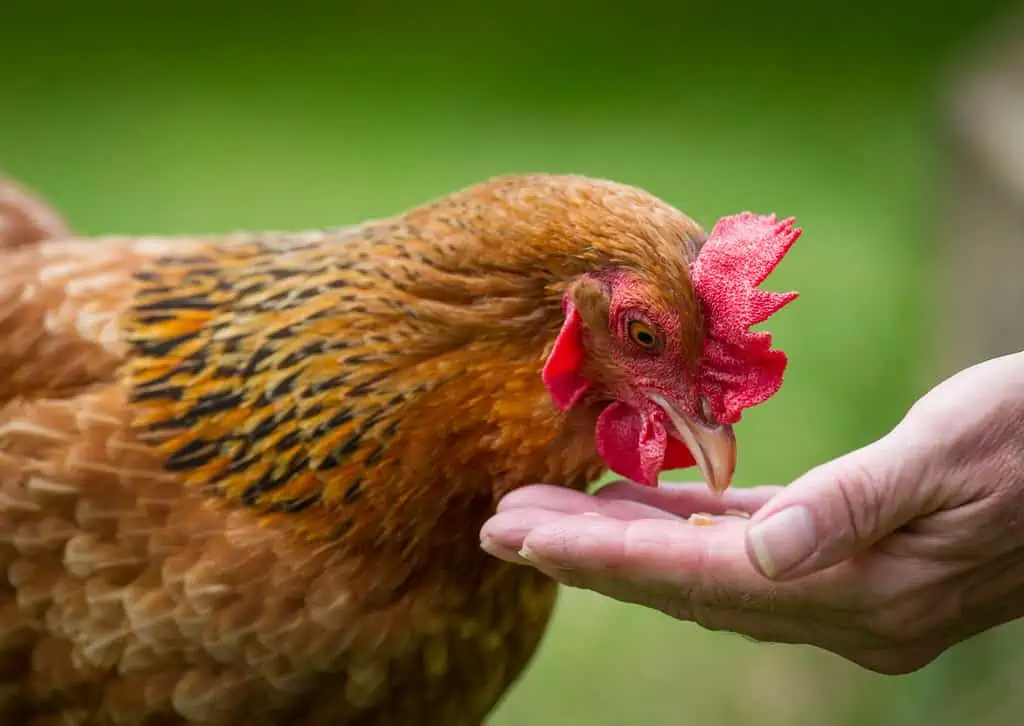
Peanuts are safe for chickens when taken in moderation. Otherwise, fowl may suffer from obesity and become prone to numerous health issues, including Fatty Liver Hemorrhagic Syndrome.
This metabolic condition often causes sudden deaths in fowl because of excessive fat levels in their livers. Besides, regular peanut consumption may lead to heart issues, liver bleeding, and egg binding.
Summary
The occasional offering of unsalted roasted or boiled peanuts to chickens is entirely safe for their health. Still, there is no evidence they are particularly beneficial for poultry as a primary nutrition source, so you should consider them treats. Avoid raw, flavored, salted, and oiled products, and never overdo it because a high-fat level may cause obesity.


